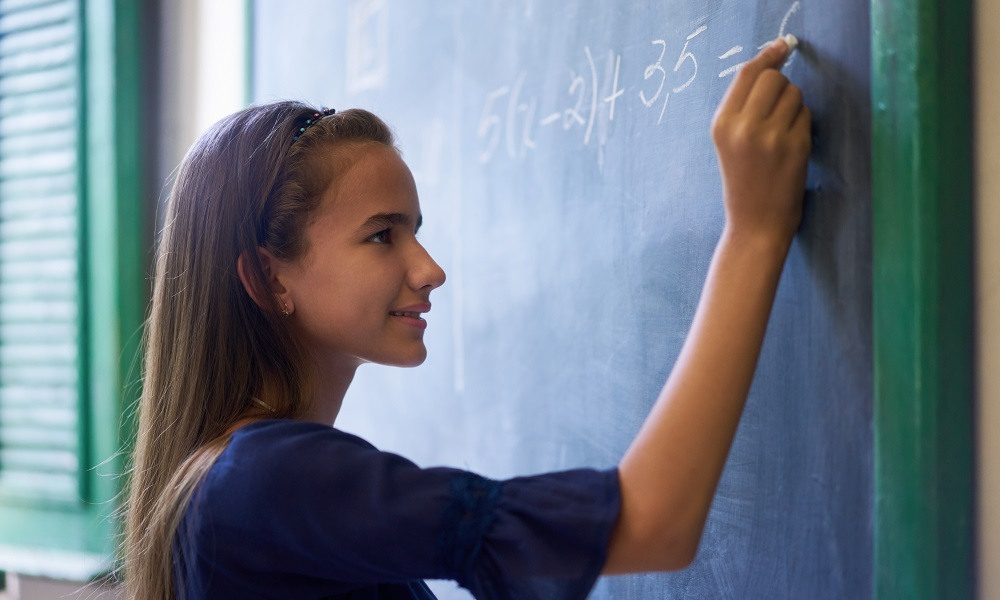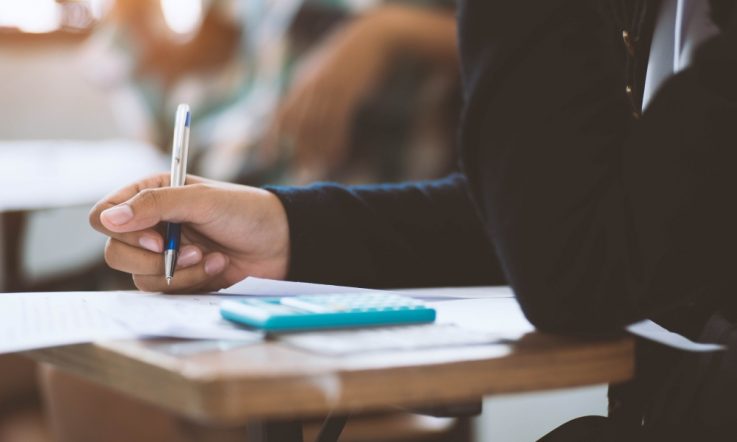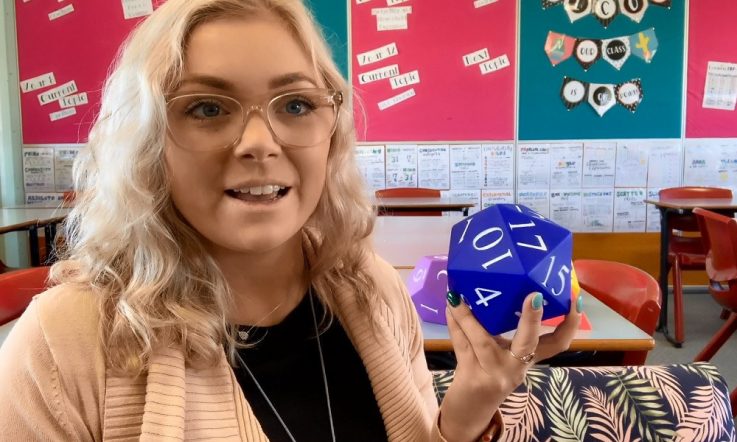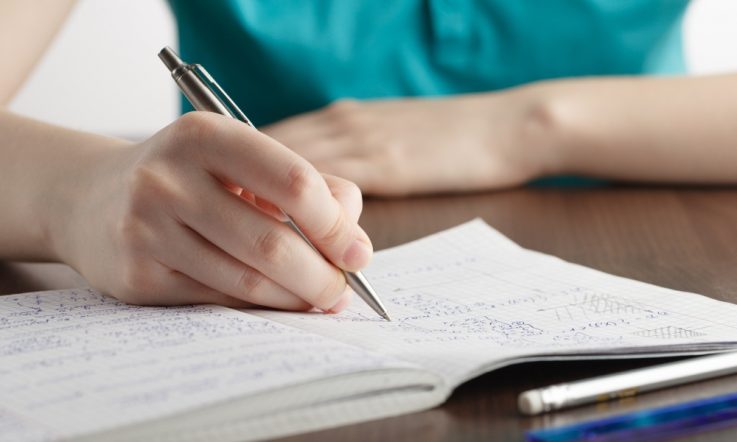This podcast from Teacher magazine is supported by Bank First. As the bank that exists to serve the education community, they are proud to support you during this challenging time. As educators you continue to go above and beyond, offering your strength, compassion, dedication, and expertise. So from the team at Bank First, thank you.
Hello, and thanks for downloading this episode of School Improvement from Teacher magazine. I'm Dominique Russell. Each year, the Australian Mathematical Sciences Institute announce winners to a range of ChooseMaths awards. At the 2019 award ceremony 11 educators were acknowledged and among them was Louise Puslednik. She took home the $20 000 award for mentoring girls in maths and she joins me in today's episode.
She's made a real impact on girls' involvement in maths at her school, St Matthew's Catholic School in Mudgee, New South Wales, which teaches around 900 students from K-12. Her work extends beyond the school, which is about three hours from Sydney, to the wider Mudgee area and Bathurst region.
The Australian Mathematical Sciences Institute Schools Program Manager and ChooseMaths Project Director labelled her a champion for engagement of girls in maths, saying ‘Louise is a powerhouse mathematics mentor and educator whose innovation, passion, leadership and contributions to regional education have and will continue to transform engagement for the benefit of many'.
Louise says forming relationships with students is paramount for her. In this episode, we're going to find out a little bit more about the initiatives she's implemented at her school in order to empower girls by highlighting the relevance of mathematics to the real world, and what careers they could have in maths or science once they leave school. Before we get started though, I just thought I'd mention, like many across the world Teacher magazine is now working remotely. So for the time being, all of our podcast episodes are going to be recorded in our home studios. To kick off this episode, let's hear about why engaging girls in maths became so important to her.
Louise Puslednik: Yeah, I think what's really interesting is I did a little study a few years ago. I had some girls in my class – clever girls, I had some clever boys, just a genuinely lovely class. But I did a little experiment and I noticed that the boys were the ones who were answering all the questions in the class. And I just sort of thought ‘what's going on here? Why do these girls not want to, you know, sort of, put themselves out there?'
And I sort of spoke to a few of them and they sort of didn't really see maths as something that they wanted to pursue later on and I just thought that was really interesting. And then I sort of went away and did a little bit of research, and I found out that a quarter of all the girls who will sit their HSC, or their exams this year, only, there's a quarter who don't even do maths.
And I just found that phenomenal. I came from a family where I was always told I could do whatever I wanted, I could be whoever I wanted, and I guess, sort of, coming from – I grew up in a rural setting as well – I sort of thought, ‘oh, well, maybe this is my opportunity to try and help these girls see that maths can be a part of their future'.
The other thing that I came across recently which I was totally stunned about was that it wasn't until 2003 that we started to use female crash test dummies. So, for 40 years, all the safety features in cars, seatbelts, are all based on the average man. So I think to have women in those STEM sort of careers, those innovators and inventors, are really important to try and eliminate that gender bias that we see that sometimes comes through.
I also think it's important for our boys to see women in those roles as well and to understand that they can work with women in the workplace and, you know, these areas aren't just dominated by men.
Dominique Russell: So I'm interested then if your focus on relationships with students or even that crash dummy fact, kind of inspired anything, any change that you went through with at your school?
LP: Yeah, so I guess I really understood that, we need to have that relationship first. And so one of the first initiatives I have been implementing over the last four years, is where we have a research mentor program with Sydney University, (the University of Sydney). So with that program, our students are mentored by an academic who comes into school and they work on breast cancer detection.
And so what they do is they take data that the research team have collected and they analyse this data. So we give them a really great basis in how to do statistics, which is something that is not, it's not taught at the Year 10 level. However once we give these kids these opportunities to sort of really get into this real world data, they really just go for it. And I think they love being able to see how we can use maths in an everyday type of context and how we can use maths to solve problems.
So that's sort of been a really great project, getting our girls involved in that. And having them have that mentor relationship with an academic where it makes them be able to see that future, to be able to know that ‘I can go off to university, I can study maths, I can study sciences, like this is part of my future'.
DR: So, could you take me through the steps you took to actually facilitate that [partnership]?
LP: Yeah, so every year we have, I host a maths, science and engineering careers expo. And so what we do is we ask some of our community members to come in and they talk to, typically sort of our Year 7 and our Year 10 kids and they talk to them about how they use maths in their job, or how they use science in their job. And it's a way of having our students understand that maths isn't just something we do in the classroom.
Like, I love it, we have a local brewery maker and he comes in and he talks about how he uses quadratic equations on a daily basis. And so it's really great for them to be able to see that, you know, it isn't, maths isn't just something that we do in the classroom. That algebra isn't something that we just move a letter from one side of the equation to the other, but it's something that people use every day.
And so as part of that we had a local academic come in, and he did the keynote speech for that careers expo that one year. And then we just sort of got talking to one another and he is really, super keen to, I guess promote science and STEM learning, particularly in rural areas where students don't always have access to universities. Our closest university is an hour and a half away. So our students here don't sort of see that on a day-to-day basis. And so we developed a partnership with the University of Sydney and this academic team and we've just sort of slowly built it.
The first year we had only a few students involved in the program, but this year we have 12 students who are involved in the program. And the beautiful thing is that they come in and they're very, they're very nervous and we talk to them about what they're going to be able to do by the end of the year, and they just can't see it.
But it's just so lovely to watch that transition and that transformation happen throughout the year and it's lovely for them to be able to come out of the other end and we can say to them, you know, ‘you've been doing first year university maths' and they sort of don't believe us at the start when we say they can do it, but they really rise to the challenge.
DR: And so you've used that example there of that partnership of going from having a few students involved to having 12 girls involved; do you have any other examples of how some of your work with these initiatives like the careers expo and the university partnership are leading to a bit of an increase in student outcomes, particularly for girls in maths?
LP: Yeah, so what's fantastic is we've also seen, initially the first year that program ran, it was dominated by boys, but we've started to see that really flip. So last year we had more girls who were part of the program. But what we've also seen is that we've got girls increasing their numbers into advanced maths subjects to study for the HSC.
I really think, so I guess the first thing I think that's key is those relationships. So developing those strong relationships with girls. But I also think giving the maths a context, making it real. I mean, coronavirus at the moment is the perfect example of how to make maths real. All of a sudden everyone's talking about exponentials and curves and flattening the curve, and even calculating how long their toilet paper is going to last.
I think also too looking at also those networks as well and how quickly we can spread the virus is also really great. Thinking about rates and rates of change. I think teachers should be trying to jump on board with that at the moment and it's such a great example of maths in action.
It's making those, the theory of the maths applicable to the everyday so that our girls can see, see where it's being used. It's not just every second question out of the textbook, but we use it every day. So I think that's sort of key to helping girls become more proficient in maths.
DR: I understand you received some funding for your school as part of prize. Do you have any plans on what you might hope to develop using that?
LP: Yeah, I think, I've sort of been having, I've had this dream in the back of my mind for a couple years now. My principal will laugh at me because he'll say to me, ‘oh, you've always got a new project on the horizon'. What we would love to do is get girls involved, and some of our younger girls, so some of our Year 5 and 6 girls, because I think to get them at that age thinking that they love maths is quite important. To get them to coming into high school already loving maths I think is key as well.
But what we wanted to do was we want to develop a project where the girls will develop light installations. And so this sort of, the idea that we're also linking to community, so we've got some really great artists in our town that we've kind of spoken to and who are excited to get on board with this project. But I think what's also fantastic is, it not only links our girls' mathematical skills, but links in their creativity.
I find it frustrating when people say mathematicians and scientists are not creative at all. I think that's a little bit of a misnomer. I think to be a great mathematician and a great scientist, you have to be creative as well.
So that's sort of our dream at the moment, is to develop a project where we can have girls, say at Year 5 up to Year 9 and 10 working on a project where they develop these light installations and to have them displayed in our community as well. So that everybody can see just how fabulous our young women are.
The work that I do isn't something that I do by myself. I have fantastic support of great staff, great principal. Also at the sort of wider Bathurst region, have great support from our catholic system. So even though I'm the one here doing the talking I need to acknowledge that it's not just my work, but it's the work of a number of different people.
That's all for this episode. Thanks for tuning in. Louise briefly mentioned the COVID-19 health crisis in this episode, so in case you haven't come across it yet, we've been publishing a lot of content to support teachers through this transition to delivering education online.
You'll be able to find information on Teacher wellbeing during COVID-19, working with parents to provide practical strategies for home-supported learning, and the myths and realities related to digital literacy of students. I'll place all the links to these stories in the transcript of this podcast episode, which you'll find at teachermagazine.com.au. You can also sign up to the Teacher bulletin there, so you never miss a story.
And, School Improvement is just one podcast series from Teacher. We have hundreds of episodes in our archive from series on Behaviour Management, Global Education, The Research Files, Teaching Methods, Action Research, and our monthly content wrap-ups on Teacher Staffroom.
Recently, we've published episodes on supporting teachers through a crisis, trauma informed practice in schools, identifying and managing student anxiety, and keeping students safe online. You'll find all of these by searching for ‘Teacher ACER' on Spotify, Apple Podcasts and SoundCloud. Make sure you subscribe to the channel so you never miss an episode.
You've been listening to a podcast from Teacher magazine, supported by Bank First. Bank First is a customer owned bank, committed to supporting the financial wellbeing of the education community since 1972. If you have been affected by COVID 19 visit bankfirst.com.au for financial support.
To better understand girls’ perception of maths and science, Louise Puslednik conducted her own research in the classroom to see which students answered questions in class.
Are you aware of any patterns in your own classroom in regards to which students answer the most questions? What do these patterns show? How could you encourage a wider range of students to volunteer to answer classroom questions?



